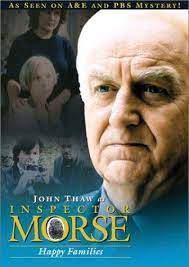
HAPPY FAMILIES
UK, 1992, 100 minutes, Colour.
John Thaw, Kevin Whately, Martin Clunes, Anna Massey, Alun Armstrong.
Directed by Adrian Shergold.
Happy Families is, as always, an interesting Inspector Morse story. While the setting is Oxford, there is nothing particularly Oxford about the plot.
Morse is his usual self, although he becomes increasingly crusty as the film goes on, with the Deputy Chief in Oxford, his frustrations with solving the murders, having to attend the press conferences, the taunts from the journalists, the photos and the articles. Lewis is a long-suffering.
The solution of the mystery seems to be part of the business interests of the allegedly happy family. In fact, it is not, quite another facet of the family concerning the mother, Emily (Anna Massey) and her affair long since. Also involved is Emily’s close friend, a psychiatrist,
In the supporting cast are actors who became much more famous afterwards including Alun Armstrong, Rupert Graves as well as Martin Clunes.
This episode was written by Danny Boyle, later to be a distinguished director with such films as Train spotting and an Oscar for Slumdog Millionaire.
- The popularity of the long-running series? Television movies? With style? The popularity of Morse and his personality, enigmatic and mannered style? The personality of Lewis? Their relationship? The solving of the crimes? Intricacy of the plot? The psychological dimensions, the mystery and clues? Police work and solving the mysteries with their own abilities? The work of Colin Dexter?
- The Oxford settings, the city and landscapes, the cityscapes, the buildings? Comments about Oxford and Oxford society? The ironies about Oxford and the dons? The university city? Ordinary people? Their interconnections? So much beauty – and so much crime?
- The quality of the mysteries, character-driven? Sufficient information, sufficient clues? The exploration of character and clues?
- John Thaw as Morse, his personality, the changes over the years, yet remaining the same? The mystery of his name? His crusty manner, the bachelor (but romantic at times)? His own authority – exercised over Lewis – and his reaction to authorities? Promotion or not? The changing of his attitudes towards Lewis, bossing him, patronising him about education and culture? The issue of music? Drinking ale? His car? Quietly at home, at work? With Lewis, understanding the situations and characters, the deductions? His being a good listener – but critical?
- The contrast with Lewis, the family man, the ordinary policeman, education and lack of education, his being put down by Morse – but enjoying his comeuppance now and again? Music and his ignorance? The first reactions, Lewis being patient? His admiration for Morse, having to do so much leg work, to formulate hypotheses? Working under pressure? Collaborator and partner of Morse?
- The police authorities in Oxford? The medical examiners?
- The quality of the film as a crime thriller, a thriller with intelligence and demands on the audience?
- The introduction to the crime, the credits, the background in Oxford, beyond?
- The range of personalities, motives? Truth and concealment? Jealousies? Deceits and angers?
- The title? I have an ease? At the meal, the disputes, business interests, Emily and her lack of business interest, the relationships, harshness, deaths?
- The death of the father, in the kitchen, the made binding him, Harry? Reactions? Harry and his walk, his death? James, the spade, his death? The suspects and motives?
- Morse as usual, but will crusty, and with Lewis, with the suspects, with the new commander, with the journalists, the press conferences, his reaction to the articles? The interviews? Is not knowing until he read the book?
- Lewis is rather long-suffering, his work, the footwork?
- The temporary chief, his reputation, the press conferences, wanting to be there, yet ousting Morse, then giving him the credit?
- The coroner and the detailed information? The maid, information?
- Emily’s friend, bringing Jessica, with Emily, talking with Morse, the care, helping Jessica, her work as a psychologist, writing the book, the machine for detecting things in the ground? The irony of the evidence of the pen and her buying it in Montréal?
- The lawyer, the type, the information, the complexities of the business interests, his love for Emily?
- The expert from Eastern Europe and his opinions? James and his double deals, against the rules of the company?
- The journalist and the photographer, critical of Morse, getting his photo at home, the articles?
- Harry, the fall, the insertion of the screw? James, the spade? Morse and his wanting to dig up the area, finding the weapon, the link to masonry work?
- Emily, with the young girl, thinking it was her daughter, even though the daughter had died at birth, her being killed by the girl? Morse and the others too late to stop the deaths? The background of Emily’s affair, with the stonemason, the family murdering and burying him?